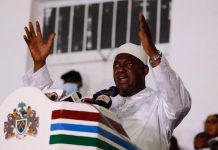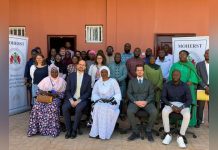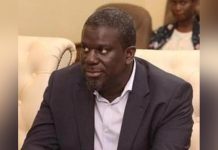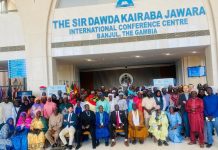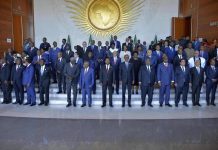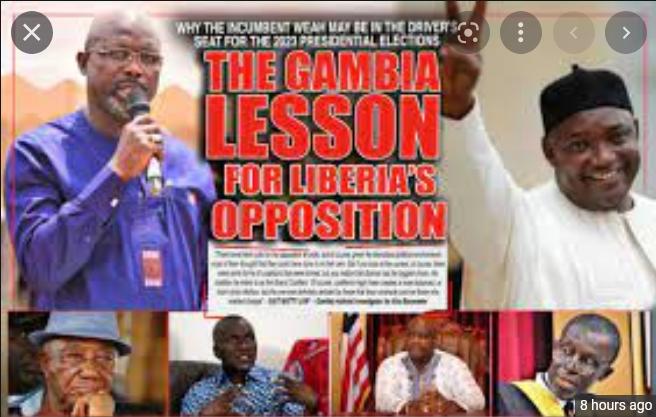
Africa-Press – Gambia. Monrovia — No one expected Adama Barrow to win – but the incumbent President of The Gambia easily won re-election, receiving 53% of the vote after last Saturday’s vote.
The Independent Electoral Commission said Barrow received 457,519 votes, about 53 percent of the total votes. His nearest rival, long-time politician, Darboe of the United Democratic Party (UDP) garnered 238,253, or about 28 percent. However, three opposition candidates have rejected the results. They are Darboe, Mamma Kandeh of the Gambia Democratic Congress (GDC), and independent candidate Essa Fall. Darboe told a news conference Sunday they were rejecting the results due to issues raised by their party agents and representatives at polling stations and the inordinate delay of results by the electoral commission.The elections was undoubtedly, a landslide vote for Barrow – that never even entered a second round.
So, what went wrong?
After all, Barrow, in the weeks leading into Saturday’s vote, turned heads when he embraced the party of former dictator, Yahya Jammeh.
Although Jammeh who is currently in exile in Equatorial Guinea, had urged his supporters not to vote for Barrow, in spite of the support from his faction of his party, the Alliance for Patriotic Reorientation and Construction (APRC), voters had the last say.
The elections result, coming five years after Barrow defeated Jammeh in an historic elections, raised questions about Mr. Barrow’s sincerity regarding the truth and reconciliation process investigation atrocities committed by the former dictator Jammeh.On the eve of the election, the names of the officials accused of bearing the greatest responsibility for gross human rights violations perpetrated during Jammeh’s 22-year rule were submitted to Barrow in hopes that they would face criminal trial.
Reminiscent of Liberia
Ahead of the elections, tension were high among victims and rights campaigners that Barrow could not be trusted to implement the TRRC’s recommendations due to his alliance with Jammeh’s party.
Mr. Barrow’s victory is reminiscent of unfolding developments in Liberia where candidates are already lining up to face the incumbent George Manneh Weah.
The opposition, perhaps hinging their hopes on the rapid deterioration in the rule of law, corruption, transparency and accountability issues, are putting all their chips on the table that Liberians will reject Weah in 2023, thus, their activities over the past few months have been marred by infighting and personal attacks amongst themselves, thereby providing an opening of a splinter opposition, the incumbent Weah is likely to capitalize on in his quest for a second.The writings on the wall in Liberia, were similarly in the cards in The Gambia in the days leading into last Saturday’s vote.
Asked in a VOA Daybreak Africa interview after Saturday’s vote whether the five opposition candidates shot themselves by not coming together to rally behind a single candidate, Mr. Sait Matty Jaw, a National Investigator for Afro Barometer said: “There have been calls for the opposition to unite, but of course, given the liberalized political environment, most of them thought that they could have done it on their own. But if you look at the context, of course, there were some forms of coalitions that were formed, but you realize that Barrow had the biggest share. His coalition he refers to as the Grand Coalition. Of course, coalitions might have created a more balanced, or more close election, but this one was definitely decided by those that favor continuity and not those who wanted change”.
The victorious Barrow, in a post-victory speech called for unity between the country’s political factions: “I call on all Gambians, irrespective of your political divide, to put aside our political and other differences and come together as one people to work towards the development of our country,” he said.
Although the opposition Darboe and two other candidates – Mama Kandeh and Essa Mbye Faal – issued a joint statement before the final result was declared, questioning the figures, the figures are likely to stand.
The opposition expressed concerns over delays, and the fact that their party agents had raised a number of issues.
Crying Foul, the New Norm
The cry of foul play is nothing new to African politics.
At the end of the second round of the 2005 Presidential elections, Weah, then an opposition candidate claimed fraud, stating election officials stuffed ballot boxes in his main opponent, Ellen Johnson-Sirleaf’s favor. However, most elections observers, including those from the United Nations, the European Union and the Economic Community of West African States declared that the election was clean and transparent. While the Carter observed “minor irregularities”, it reported no major problems. In fact, Johnson-Sirleaf, at the time, reminded the press that Weah had 72 hours to bring evidence of wrongdoing to her campaign according to Liberian law, calling the accusations “lies” and stating that Weah’s supporters “just don’t want a woman to be President in Africa.”
Similarly, during the second round of the 2011 presidential elections which secured Madam Sirleaf’s second term, Mr Weah’s party again claimed that the elections were fraudulent.
After the first round of voting in the 2011 elections, Sirleaf led the presidential field with 43.9% of the vote, followed by Winston Tubman of the Congress for Democratic Change with 32.7%. As no candidate received an absolute majority, Sirleaf and Tubman stood in a run-off election held on November 8, 2011. Tubman alleged that the first round had been rigged in Sirleaf’s favor and called on his supporters to boycott the run-off.
In The Gambia, The ECOWAS, the African Union, Commonwealth, European Unions and all other international and local election observers to include civil society organizations have all declared the elections free, fair and transparent.
As a result of the ongoing infighting within the opposition, the incumbent Weah is already predicting a landslide victory in 2023, boldly suggesting that the opposition would claim the election was rigged.
Addressing journalists in October, President Weah said: “In 2017, they pronounced that I’ll never become President in this country, now I’m the President. They’ve come again, they say I’ll be a one-term President, my work will speak for me. The Liberian people will go to the polls and I’ll defeat any individual that will come in that race. Next election those people will be crying ‘They cheat me, they cheat me, because I’ll beat them unmercifully.”
The incumbent then went on to predict that he would win all 15 counties in 2023 unlike 2017 where he won 14 of the 15 counties.
The uncertainty and uneasiness in Liberia over the lack of coherency in the opposition was a major point highlighted by former President Ellen Johnson-Sirleaf in a 2016 FrontPageAfrica interview when she stated: “No political party as I see it, based on my political experience will win this election without a coalition. I don’t think any political party can win on its own, given the number of parties. So, if you see people negotiating, dialoguing and all, it’s because they all realize that some coalition has to be made for a particular party or parties to be competitive.”
While that much may be true, the ongoing fracas within the opposition alliance comprising the former ruling Unity Party, the All Liberian Party, the Alternative National Congress and the Liberty Party suggest otherwise.
The results in The Gambia comes amid serious infighting within the opposition alliance in Liberia.
Opposition in Disarray
Over the past few months, members of the Collaborating Political Parties (CPP) have been going at each other’s throats over allegations of tampering of framework document, bloc voting and simmering distrusts.
The distrust has split the CPP into two unlikely alliances with the ANC and a faction of the Liberty Party on one hand and the former ruling Unity Party and the All Liberian Party on the other.
Over the past few days, the leader of the ANC, Cummings, made a proposal to the current Chairman of the CPP, Mr. Joseph Boakai in order to restore sanity to the CPP and to renew the hopes and aspirations of those looking toward defeating the incumbent Weah in 2023.
Mr. Cummings has proposed the setting up of an Independent Committee of at least 5 persons to be drawn from credible national organizations and respected individuals to complete the investigation into the allegation surrounding the Framework Document by answering the central question of whether or not there are amendments made to the agreeable Amended Version of the Framework Agreement of the lawyers, which was approved by the Parties, and filed with the National Elections Commission (NEC) for the registration of the CPP; and if so, what are the details of those amendments.
Mr. Cummings, who has insisted on an apology from his peers who accused him of tampering with the framework document, is also seeking the establishment of a timeframe of two weeks for the Independent Committee to return its findings to the National Advisory Committee (NAC) for its conclusive resolution of this matter at its next meeting.
The backdrop comes in the wake of a recent suggestion by Senator Nyonblee Karnga-Lawrence that Mr. Cummings should take ownership. “In light of the violations in procedures and content change, it is reasonable enough that Mr. Cummings summons the courage to take ownership of all that has transpired and the crisis thereof.” The accusation was endorsed by Boakai and Benoni Urey, political leader of the All Liberian Party (ALP) — three parties against one.
Upon assuming leadership of the CPP, Mr. Boakai, acknowledged deep divisions within the CPP and appealed for calm. “We recognize these challenges, which have occasioned internal wrangling and a distasteful impression,” former VP Boakai disclosed. “A new day for the CPP has dawned! We must put our differences behind us and forge ahead by bringing our strengths – and frankly our weaknesses, too – together in the true spirit of the framework to fulfill the aspiration and hope of the Liberian people.”
In further acknowledgement of the issues within the CPP, Mr. Boakai, recently promised to reach out to his counterpart, Cummings in an effort to ensure that the internal wrangling within the CPP is resolved. In a recent VOA interview with James Butty, Mr. Boakai said he intends to bring the CPP leadership together for a recommitment to the ideals of the Collaboration.
Mr. Cummings, who says he feels disrespected by his peers, has insisted he will not accept any “behind closed doors” solutions in resolving an internal conflict within CPP and has turned down a proposal by Boakai.
Mr. Cummings and his ANC say, they remain resolute that the CPP under Mr. Boakai, sets up an independent committee of five persons from credible institutions to complete the investigation within two weeks and return its findings.
Lots of Opponents Eyeing Weah’s Seat
As a result of the ongoing impasse within the CPP, some Liberians are beginning to look at alternatives with Cllr. Tiawon Gongloe, Human Rights Activists and former President of the Liberia Bar Association, accepting a petition to contest the presidency, while casting himself as the best ‘alternative’ among all opposition candidates who are eyeing the Presidency.Accepting his petition at the weekend, Cllr. Gongloe said Liberia is in dire need of a steely leader like himself to take Liberia from backwardness to sustained peace, progressive development, and prosperity.
While announcing his bid for the Presidency over the weekend, Cllr. Gongloe asked Liberians and all those frustrated with “poor governance, poverty, and corruption” in the Weah administration to put the task of defeating them above all other ambitions.
In a speech focused on outlining his ambition, Cllr. Gongloe presented himself as a leader who would govern by the rules in a country ‘wracked by poverty, corruption, and unemployment.’
Besides Gongloe, Dr. Daniel Cassell of the People’s Liberation Party (PLP) is also projecting himself as the real alternative to change.
For many political observers, the splintering of the opposition, leading into the 2023 presidential elections could spell trouble.
In the October 1985 elections, President Samuel Kanyon Doe, was proclaimed the winner in an election he is widely believed to have lost to Jackson F. Doe of the Liberia Action Party.
In that election, Jackson Doe secured 137,270 votes for 26.45 percent, Gabriel Kpolleh, a schoolteacher, secured 59.965 votes for 11.55 percent while Edward Kesselly of the Unity Party secured 57,443 votes for 11.07 percent. The Liberian Constitution requires an absolute majority or 50% plus one (1) to avoid a run-off but many political observers at the time believed that a united front against Doe may have made it tougher for the incumbent to steal the votes.
At the time, many political observers were of the view that if the four political parties had put their forces together, it may have curbed Samuel Doe’s margin of victory or left very little room for irregularities.
Similarly, during the reign of President Charles Taylor, a similar scenario played out that saw Taylor win the presidency by a landslide, with 75.3% of the vote, despite campaigning on the slogan: “He killed my ma, he killed my pa, but I will vote for him.” His closest competitor, Ellen Johnson-Sirleaf, collected only 10 percent of the vote. Eleven other candidates failed to crack more than five percent.
Despite the concerns, some in the Liberian discourse disagree, insisting that the situation in The Gambia is different from Liberia.
Mo Ali, Secretary General of the former ruling Unity Party, now a member of the CPP alliance says: “The Gambia is doing far better than Liberia when it comes to economic development and improvement in the lives of the people. While there may be complains from some quarters in the Gambia, generally Barrow was re-elected on his merits. This is the contrast to Liberia. We have a government that doesn’t care about the economic development and social well being of the people. There is massive unemployment in the country.”
For More News And Analysis About Gambia Follow Africa-Press

